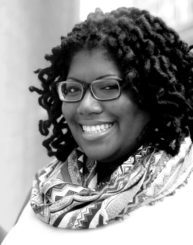
As a Christian fat-acceptance advocate, I’m in tune to the way we talk about bodies—in our churches, at our conferences, and in Christian books, radio, and other media. I grew up in the Christian church, and it was the place where most of my body shame came from. I believed that if I loved God, I would somehow figure out how to be thin, because I was taught to believe that a thin body is a godly body. I never did figure out thinness, but I did discover more about God.
God cares about how well I love my neighbors, not the size of my body. My body, fat as it is, is made in the image of God and treasured by God. I am passionate about encouraging the church to examine the way its teaching shames fat bodies, and denies the image of God found there—hurting the church’s ability to love God and neighbors in the process.
Recently, I had someone point out to me an event at a Christian college that focused on recovering from eating disorders. They noticed something, though: all the speakers were thin—suggesting that even when you have successfully recovered from disordered eating, your body will still look thin. Prompted by this discussion, I asked a few women that I know who care about body image and the church to answer a few questions about their experiences with how the church has talked, or failed to talk, about bodies. Their answers are instructive about the ways that calling fat “bad,” or excluding fat people from the discussion on bodies, is damaging to the Body of Christ.
Read their thoughts below.
Introduction to the Panelists
Amanda Martinez Beck: I’m a writer, size dignity activist, and stay-at-home mom of 4 kids ages five and under. I call myself a fat Christian and I have a blog on my website dedicated to this experience—fatinchurch.com.
Alicia Crosby: I live in Chicago where I am the executive director of a small nonprofit that I co-founded in 2015. While others would affix different labels to me, (e.g. plus sized, big) I’d self-describe as fat.
Antonia Terrazas: I’m a fat femme hospital chaplain resident in Dallas, TX with a love of lipstick, leggings-as-pants, liberation theology, and liturgy. I am a recovering Pentecostal fundamentalist making my home in the Episcopal church. I graduated from Baylor University with a degree in Great Texts of the Western Tradition, and recently from Duke Divinity School with my MDiv. I one day hope to be responsible enough to adopt a dog.
Questions
- What is your experience with eating disorders and/or body image struggles?
Alicia: I’ve always been a bigger girl. As a child, I was one of the first people I knew to hit puberty and as such, I was more shapely than the other girls I grew up with. When you have breasts, thickening thighs, curves and a larger frame at 11 or 12, and your peers are all rail thin, you get self-conscious. Few people know this, but I wrestled with bulimia when I was in the 8th grade. Things were so out of control with my eating that I would eat things like carrots and then purge. I don’t think I actually wanted to be thin, I just wanted to have a body that people didn’t describe as different. This went on for a few months and I’m not 100% sure what made me stop—it may have been me feeling like I hit a low by throwing up vegetables.
I don’t think I actually wanted to be thin, I just wanted to have a body that people didn’t describe as different.
Amanda: I cannot remember not being fat, or at least perceiving myself that way. I have some sort of compulsive eating disorder, and yet I have a great body image now. Of course, there are hard days when the lies are easier to hear than the truth.
Antonia: I am in weight loss recovery, a “diet industry dropout,” if you will. I have been the “fat friend” for as long as I can remember. I was in Weight Watchers as a young teen—as early as fifteen, I think. Early enough to need a doctor’s note to join the program. I would be dieting on and off again until the end of college, when I finally decided to say goodbye to dieting for good.

I realized that trying to lose weight made me hate my body more and more, even as I lost. It took me longer to realize how obsessive and anxious it made me, impulses that have followed me to this day. When I decided to ditch the scale, my attitude went the opposite way out of spite, like “#&@% this, I am eating pizza and donuts and a milkshake in the same meal, so THERE.”
As I have tried to find healthy eating habits again that are decidedly NOT about weight loss, I realized that I don’t know how to think about food in a wholesome way between the extremes of free-for-all, and looking up the “points” for an apple or a stick of gum. I am learning to balance giving my body good things, and eating with pleasure (and surprising myself with how often those things overlap!). I am also learning to stop making moral claims about how I eat (“I was so bad today, I ate TWO doughnuts”) and even harder, to not associate eating well with losing weight—the two don’t always go together, and weight loss is not inherently healthy.
- Why is body image something that people, but Christians specifically, should care about?
Alicia: We need to focus on the body, and how we view said body, because failure to do so literally gives us disembodied theologies. It is just as dangerous to neglect our physical selves as it is to ignore who we are as spiritual beings. We are never just emotional or physical or spiritual; we are complex beings whose various parts and pieces need to be acknowledged and honored. When we engage in navigating the world in a disembodied way and fail to consider our bodies (and the messaging around them), we invite harm.
Amanda: Fat people are usually on the margins of leadership in the church. Their needs, and what they have to offer, often get overlooked because of anti-fat bias that has been ingrained, even in Christians. This being true, the Church is missing out on deep wisdom from some of its members; the body of Christ is not whole without fat Christians. Christians should be known for championing those on the margins, whether it be for ability, race, size, orientation, or gender.
- In what ways has the church contributed to disordered eating or poor body image in your life?
Antonia: Oh, so many ways, but there are a few that endure for me especially. One was tied, unsurprisingly, to incessant abstinence/purity culture teachings. These teachings alternated between descriptions of punishment for committing the “sin” of premarital sex, and the dangling carrot of the rewards for waiting. One recurrent example of the latter was when the preacher would share his “waiting” testimony, and then ask his “smokin’ hot” wife to stand up so he could show off his prize. The smokin’ hot part was particularly emphasized, and only one kind of smokin’ hot was presented—very thin, very manicured in every way, very Texas hair. In the twisted way that this thinking manifested, I would think, “Oh no, a man (and it was always a man) waiting for a smokin’ hot wife will never want me. I am not a good enough ‘prize.’” Obviously there is a lot to unpack there.

Alicia: I don’t think the church has good theology around the body, period. It’s assumed that the possession of a fat body is representative of a sin or a moral failure. Another harmful way that the church messages around fatness is through fasting campaigns. Some of the fasts that churches engage in cause disordered and imbalanced eating, that are more disruptive to an individual’s wellness than not. Add to that, I’ve seen a trend recently where churches add competitive weight loss challenges to their fasts, which lend to disordered eating and body image issues. People are following non-medically approved eating plans that may end up doing more harm than good, and are pushed to do so under the guise of orienting themselves to better hear God. That also lends itself to how we equate suffering with holiness…but that’s a topic for another time.
- In what ways has the church helped you to embrace food/eating and your body?
Amanda: Discovering the sacramental nature of life led me to reject the gnostic idea that the spirit is good and the flesh is bad. Jesus is a human being, still, seated next to the Father in heaven, and he is both spirit and flesh, and he is holy. Also, the fact that as a Catholic I believe that we eat Jesus in the Eucharist—he brings us together in a meal. This reality has helped me greatly to embrace eating as part of God’s good creation.
Antonia: Not much, honestly. One way comes as a very roundabout way. When I was beginning to fall in love with the liturgical calendar, a friend of mine pointed out something crucial in the way the penitential season of Lent is followed by the celebratory season of Eastertide. The 40 days of Lent, in which it was common to take up a fast (a practice that has also certainly been abused), was balanced by 50 days of feasting (not just one day!) during the season of Easter. A fast that makes us aware of our finitude, followed by a feast that allows us to taste the sweetness and the abundance of resurrection. This has certainly influenced the way I relate to eating as a sacramental act. And did you catch the math? 40 days of fasting compared to 50 days of feasting—to me this seemed like an ancient rebuttal to the “calories in, calories out” of the disordered eating habits of diet culture. The lesson is that in resurrection life, we can give more emphasis to abundance than to scarcity.
Alicia: It hasn’t. The church isn’t good at celebrating things that fall outside of what it considers to be normative, so my fatness has never been celebrated or affirmed.
In resurrection life, we can give more emphasis to abundance than to scarcity.
- What do you want pastors and church leadership to know about body image and eating disorders?
Alicia: What you say matters. How you speak about the body matters. Your congregants, young and old, will either feel affirmed or take on shame depending on how you choose to speak about the body and the relationships we have with food. Your messaging could very easily push someone into patterns of disordered eating because of the triggers that may lie within them. You are called to be healers and cultivators of space where people can enter their rest, and that extends to creating an environment in which people can celebrate their physical personhoods.

Amanda: I want them to know that how they talk about their bodies will filter down into their congregations. If they hate their own bodies, they will lead others to do the same. If they make peace with their bodies, they will lead others in the path of peace. I hope they learn how to model joy and delight in their own bodies, for the sake of the Body.
- What do you believe is true about what God sees in your body?
Alicia: I think that God thinks I’m beautiful, and celebrates me where I am because I am. God rejoices over me when I feel like I’m at my best or when I feel like I’m struggling—physically, mentally, or spiritually. I am loveable regardless of where I am. God loves me…period. Full stop. With no conditions. God’s loving me extends to loving who I am, and how I carry my physical personhood.
Amanda: God sees all my cells in my body. He knows the ones that are hurting, the ones that are repairing, the ones that are dying, and the ones that are springing to life. They are an amazing cooperation of matter! I think he sees my body truthfully: Amanda weighs 285 pounds. He loves every bit of my body, and so I need not carry any shame. I used to think that weight was a moral issue—it’s not.
- Do you have any personal practices or spiritual disciplines that you’ve found to be helpful in embracing your body?
Antonia: Honestly? Using coconut oil as a regular body moisturizer. It took some practice, but now I can’t help but feel pleasure and love when working the stuff into my thighs, hips, and belly especially.
Amanda: I specifically wear cute, tight-fitting clothing to the gym, because I am not afraid of how I look in workout clothes anymore. I just look cute. When I look in the mirror and am tempted to compare myself to the other women I see in tight-fitting clothes, I say, “No thanks. I’m not going to compare myself to them. I like what I see, because that’s me in the mirror. I like me.”
I hope pastors and church leaders learn how to model joy and delight in their own bodies, for the sake of the Body.
- Do you have a favorite piece of art (music, visual art, whatever) that reminds you of your body’s worth, or helps when you are struggling with body image or eating disorder issues?

Amanda: My kids and I are obsessed with Justin Timberlake’s “Can’t Stop the Feeling.” We turn it on and dance our hearts out. The line “Nothing I can see but you when you dance” resonates in my heart when I see them dancing. I desperately want them to know that their momma loves her body and that it is good and right for them to love their own, because we are each created in the image of God.
Alicia: When I’m having a moment where I’m struggling with my body image, I like to listen to something like dancehall, trap music, or Beyoncé—music that I can’t help but dance or shimmy to. Music helps me center myself and dancing helps me connect with this body that is capable of experiencing joy, pleasure, and every good thing God has for me.
Antonia: Best question ever! I feel like I am always searching for these very things.
- I love following fat-positive accounts on instagram. I follow Jes Baker’s advice of becoming more fat positive by looking at pictures of fat people. In a world where fat folks are erased or only portrayed in dehumanizing ways, fat-positive exposure does a LOT.
- Lizzo’s music and her obvious love of her own body—I’ve never seen her perform in anything but a bodysuit and tights. #goals
- Venus of Willendorf—this ancient sculpture is a touchstone for me to remember that beauty standards are always changing, and that at one point, bodies that looked like mine were considered more divine.
- Artwork by Rachele Cateyes of Portland and LadyatLarge on Etsy. (Some of the images may be NSFW.) They both draw fat women (or mermaids) in beautiful, free poses. I love them so, so much. It’s so healing to see these beautiful, mystical creatures that look so much like the person I see in the mirror (um….minus the fishtail of course).
May we see the image of God in everyone, and be mindful of the ways our talk about bodies encourages or discourages the people around us to view themselves as loved completely by their Creator.
J. Nicole Morgan is a fat woman who lives near Atlanta Georgia, where she works for a non-profit trying to make the world a bit more just and peaceful. She loves to spend her free time thrifting, sewing, and hanging out with her nieces and nephew. She is currently writing a book on Christian faith and fat acceptance. Look for it spring 2018 from Fortress Press / Theology for The People.



One Response
I think you are really off base here and I think your hang up on your body is your personal problem that you have turned around on the church… I have never in all my years in the church in Florida, Ohio, California and Pennsylvania ever heard one minister or any Bible teach talk about fat bodies or shame of it or anything… you reaching a little too far here… You are part of a group that does not like the evangelical church and wants to find fault in all of its message. You body weight is your struggle and not a theological problem. Get over yourself and your self-centeredness and live your life.